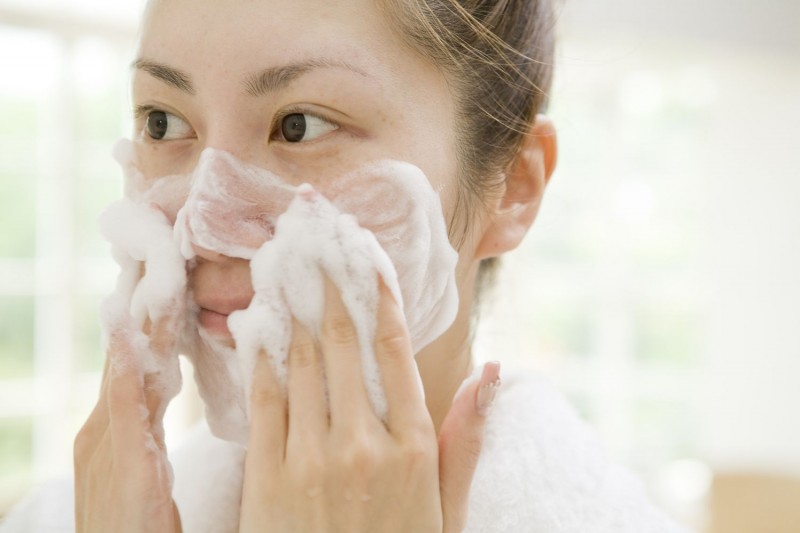
When shopping for a scrub, it's crucial to keep several factors in mind to ensure your skin's health and well-being. Failure to do so may result in skin irritations and rashes. Let's delve into these considerations in more detail.
Understanding your skin type is the first step in selecting the right scrub. Your skin type greatly influences how it reacts to various products, including scrubs. Here's a breakdown of skin types and what to look for:
If you have oily skin, you're no stranger to the frustration of excess sebum production. The right scrub can help control oiliness and prevent breakouts. Look for a scrub that contains ingredients like salicylic acid or glycolic acid. These acids penetrate deep into the pores, effectively exfoliating and reducing excess oil. They also help prevent clogged pores, blackheads, and whiteheads.
On the other end of the spectrum, individuals with dry skin need a scrub that provides exfoliation while maintaining moisture. Opt for a scrub that contains moisturizing ingredients like shea butter or hyaluronic acid. These ingredients help replenish and lock in moisture, preventing further dryness and flakiness.
Sensitive skin requires a gentle touch. It's prone to irritation and inflammation, so it's crucial to choose a scrub with no harsh chemicals or fragrances. Fragrance-free, hypoallergenic scrubs with natural exfoliants like oats or rice bran are ideal for sensitive skin.
The ingredients in a scrub play a vital role in its effectiveness and safety. Let's explore some of the key components to seek out:
Many people prefer scrubs with natural ingredients because they tend to be gentler on the skin. Look for scrubs that feature natural exfoliants like sugar, oats, or finely ground nuts. These ingredients provide effective exfoliation without causing microtears in the skin.
Exfoliating agents are the heart of any scrub. They work to remove dead skin cells, revealing fresh, radiant skin. Alpha hydroxy acids (AHAs) and beta hydroxy acids (BHAs) are popular choices for exfoliation. AHAs, such as glycolic acid, are water-soluble and effective at removing the top layer of dead skin cells. BHAs, like salicylic acid, are oil-soluble and penetrate deeper into the pores, making them ideal for oily or acne-prone skin.
To prevent skin issues, it's essential to steer clear of certain additives and chemicals. Here are some to avoid:
Microbeads are tiny plastic particles that were once commonly found in exfoliating products. However, these beads harm the environment, as they can end up in waterways and oceans. Additionally, they can be harsh on the skin, causing microtears and irritation. Thankfully, many countries have banned microbeads in cosmetics.
Artificial fragrances may smell pleasant, but they can cause allergies and skin reactions in some individuals. To play it safe, opt for unscented or naturally scented scrubs. Natural fragrances derived from essential oils are less likely to trigger adverse reactions.
The texture of the scrub matters for a comfortable and effective exfoliation process. Consider the following:
Scrub textures vary from fine to coarse. Fine scrubs are smoother and less abrasive, making them suitable for sensitive skin. Coarse scrubs have larger exfoliating particles and can provide a more intense exfoliation. The choice between fine and coarse scrubs depends on your skin's sensitivity and your exfoliation goals. For regular use, especially on sensitive skin, fine scrubs are often the safer choice.
How often you use a scrub can impact your skin's health. Here's what you need to know:
Exfoliation is a vital part of skincare, but overdoing it can lead to irritation. Determine how often your skin can tolerate exfoliation. For most skin types, once or twice a week is sufficient. However, if you have very sensitive skin, you may need to exfoliate less frequently.
Before using a new scrub, it's wise to perform a patch test to ensure it doesn't cause adverse reactions. Here's how to do it:
Choose a small, inconspicuous area of your skin, like the inside of your wrist or behind your ear. Apply a small amount of the scrub and wait for 24 to 48 hours. If you notice any redness, itching, or irritation, avoid using the product on your face or body.
After exfoliation, your skin may be more sensitive to the sun. Protecting your skin is essential:
Always apply sunscreen with at least SPF 30 after exfoliating. This shields your skin from harmful UV rays and prevents sunburn and potential damage.
Choose well-known and reputable brands when purchasing skincare products. Here's why it matters:
Check customer reviews and ratings for the scrub you're interested in. Positive reviews and high ratings often indicate a product's effectiveness and safety. Additionally, established brands are more likely to adhere to quality and safety standards.
When in doubt, seek advice from a dermatologist who can recommend a scrub suitable for your skin type. Dermatologists are skincare experts and can provide personalized recommendations based on your specific needs and concerns. Selecting the right scrub is essential for maintaining healthy, radiant skin. By considering your skin type, ingredients, and potential irritants, you can make an informed choice that promotes skin health and prevents rashes and irritations. In summary, remember that not all scrubs are created equal, and a thoughtful approach to scrub selection will keep your skin glowing and problem-free.
Avantika Devi Temple: Where History and Divinity Converge
Bangalore Metro Purple Line Opens For Locals; Know About Time, Fare and More
Children start vomiting while traveling in a car, keep 5 things in mind